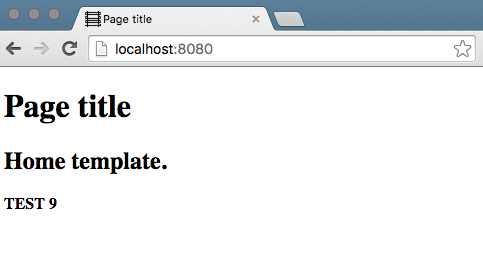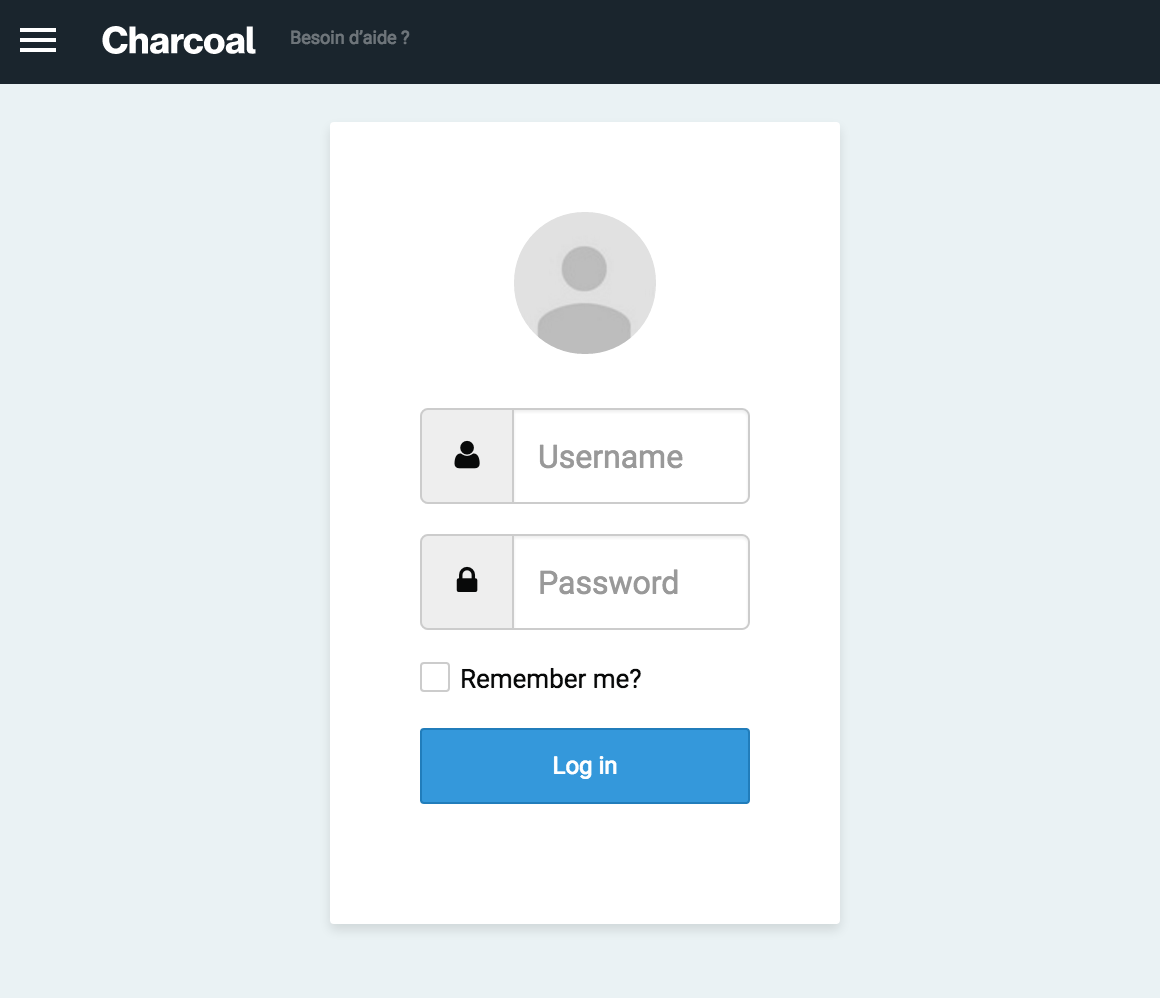locomotivemtl / charcoal-project-boilerplate
A Charcoal Project Boilerplate
Installs: 459
Dependents: 0
Suggesters: 0
Security: 0
Stars: 26
Watchers: 13
Forks: 3
Open Issues: 2
Type:project
pkg:composer/locomotivemtl/charcoal-project-boilerplate
Requires
- php: ^7.4 || ^8.1
- locomotivemtl/charcoal-admin: ^0.30
- locomotivemtl/charcoal-app: ^0.9
- locomotivemtl/charcoal-attachment: ^0.10
- locomotivemtl/charcoal-cms: ^0.10
- mustache/mustache: ^2.14
Requires (Dev)
- phpstan/phpstan: ^1.7
- phpunit/phpunit: ^9.5
- seld/jsonlint: ^1.9
- squizlabs/php_codesniffer: ^3.6
- vimeo/psalm: ^4.23
README
⚠️ This skeleton is built for
locomotivemtl/charcoal-*and is deprecated in favour ofcharcoal/boilerplate.
The goal of this project is to provide a fully working "boilerplate" (empty skeleton project) using the Charcoal framework.
It can also optionally set up the Locomotive Boilerplate for the frontend.
Table of Content
- How to Install
- Going further
- More config customizations
- Creating a custom template
- Using objects
- Customizing the backend
- Dependencies and requirements
- What's inside this Boilerplate
- Development
Intended scope
Although it is fully ready to use, this boilerplate is still incomplete. It does not yet showcase all of the Charcoal features and therefore require a lot of manual tinkering for options.
Here is a short "mission statement" of what is expected to be accomplished with this project:
- A fully automated setup process.
- Optionally install
locomotive-boilerplatefor the frontend.
- Optionally install
- Translation (l10n) fully working with
charcoal-translator.- Default data also provided in english and french.
- ...and spanish and more...
- A working "backend" with
charcoal-admin.- User set up automatically.
- With a default configuration that allows to manage CMS objects (sections, news, events, blogs, locations, etc.)
- Permission system working and enabled.
- Notification system working and enabled.
- Revisioning system working and enabled.
- Media library working and enabled.
- Built-in help (doc) system working and enabled.
- A few default, common templates (mustache) built-in.
- Home page, with a few options and widgets (like carousel) or similar.
- News list / news details, with attachment support.
- Calendar (event list) with ajax options / event details, with attachment support.
- Blog / article details, with attachment support and options to enable comments, and ajax actions
- Contact, with a contact form that saves to a database and send a confirmation email depending to category options, with ajax actions.
- Map, with locations by categories.
- Metadata 100% fully working on every pages and for every objects.
- Use objects' metadata information, which all are editable in
charcoal-admin.
- Use objects' metadata information, which all are editable in
- Provide an optimized set of SEO features.
- Search enabled
- Results returned for all types of cms objects (sections, news, events, blogs, locations, etc.)
- Used keywords, which all are editable in
charcoal-admin. - Also search in attachments.
- Auto-complete enabled and working.
- 100% tested with PHPUnit.
How to Install
To start a Charcoal project with this Boilerplate, simply:
1. Installing boilerplate
Charcoal uses the Composer create-project command to install the boilerplate:
★ composer create-project --prefer-dist locomotivemtl/charcoal-project-boilerplate acme
Replace "acme" with the desired directory name for your new project.
About the Document Root
👉 The project should not be cloned directly in a web-accessible directory. The web server should be configured to serve the
www/folder directly (or through a symlink). The other folders (vendor/,src/,templates/,metadata/,config/, etc.) should therefore not be available from the web server (kept outside the document root).
2. Test your installation
A quick server can be started using the PHP builtin server:
★ cd www
★ php -S localhost:8080
Point your browser to http://localhost:8080/ and you should see the boilerplate's default home page.
How to change the default page and add routes/templates is explained later in this README.
Hint: the recommended way is from the admin, by adding pages (sections).
3. Set up a database storage
The next step requires a custom configuration file.
It is recommended to use config/config.local.json and making sure it is not committed to source control:
★ cp config/config.sample.json config/config.local.json
Then edit the config/config.local.json file with this information.
If your project does not require any database storage, use a database in memory such as SQLite by adding the following to the config/config.local.json file:
{
"databases": {
"default": {
"type": "sqlite",
"database": ":memory:"
}
},
"default_database": "default"
}
If your project uses MySQL, create an empty database and ensure a SQL user has the proper permissions for this database. Then add the following to the config/config.local.json file:
{
"databases": {
"default": {
"type": "mysql",
"hostname": "127.0.0.1",
"database": "foobar",
"username": "foo_bar",
"password": "F00$BâR123"
}
},
"default_database": "default"
}
4. Set the project name
By default, the project is named "Acme" and namespaced under App and is autoloaded by Composer using the PSR-4 autoloading standard.
There are a few occurrences of "Acme" in the boilerplate:
- config/admin.json: See
admin.title. - config/config.json: See
project_nameandcache.prefix.
You should also change the information of the Composer package:
- composer.json: See
name.
5. Set up charcoal-admin
A quick-and-dirty script is provided to install charcoal-admin automatically:
★ sh ./build/scripts/install-charcoal-admin.sh
Point your browser to http://localhost:8080/admin and you should see the Charcoal's admin login screen.
The next step to customize the backend is to configure the main menu, as well as the various admin options.
See the config/admin.json file for details.
Refer to the
charcoal-adminhelp for more information.
6. (Optional) Install locomotive-boilerplate)
Another quick-and-dirty script is provided to install the locomotive frontend, from its github repository.
★ sh ./build/scripts/install-locomotive-boilerplate.sh
For more information about the
locomotive-boilerplatefrontend module: visit https://github.com/locomotivemtl/locomotive-boilerplate
Dependencies and Requirements
PHP 7.4+ext-jsonext-pdoext-splext-mbstring
External libraries
Most Charcoal features are built on top of proven, open-source technologies:
- Composer (Deployment and auto-loading)
- Slim (PSR-7 App Framework)
- FastRoute (Router)
- Pimple (DI Container, from symfony)
- Mustache (Templating Engine)
- Optionally supports Twig, from symfony
- PDO / MySQL (Database Storage)
- Stash (PSR-6 Cache)
- CLImate (Terminal Utility, from the php league)
- Flysystem (File system abstraction, from the php league)
- Symfony Translation (Localization Tools)
- Laminas ACL (Permissions Management)
- PHPmailer (Email Transport)
- Monolog (PSR-3 Logger)
- PHPUnit (Unit Testing)
- APIGen (API Documentation)
- PHP Code Sniffer (Coding Standards)
- jQuery (Javascript Framework)
- Bootstrap (CSS Framework)
- TinyMCE (HTML Editor)
- elFinder (File Manager)
- Github (Source control)
- Travis (Continuous Integration)
The Charcoal modules
- charcoal-admin
- The backend, or control panel.
- charcoal-app
- App components based on Slim.
- charcoal-attachment
- Additional attachments to content objects.
- charcoal-cms
- CMS objects (Section, News, Events, etc.)
- charcoal-config
- Base configuration system.
- charcoal-core
- Core objects, Model, Source.
- charcoal-email
- Email utilities, based on phpmailer.
- charcoal-factory
- Dynamic objects creation.
- charcoal-image
- Image manipulation and effects.
- charcoal-object
- Object definition (Content and UserData; based on Model), behaviors and tools.
- charcoal-property
- Metadata's properties.
- charcoal-translator
- Translation utilities, based on Symfony.
- charcoal-ui
- Ui objects (Form, Menu, Dashboard, Layout, etc.)
- charcoal-user
- User definition, authentication and authorization (based on Laminas ACL).
- charcoal-validator
- Data validation.
- charcoal-view
- View renderer. (mustache, twig, etc.)
Status matrix
| Module | Version | Travis | Scrutinizer | Insights | Coveralls | PHPDoc | ApiGen |
|---|---|---|---|---|---|---|---|
| admin | PHPDoc | ApiGen | |||||
| app | PHPDoc | ApiGen | |||||
| attachment | PHPDoc | ApiGen | |||||
| cms | PHPDoc | ApiGen | |||||
| config | PHPDoc | ApiGen | |||||
| core | PHPDoc | ApiGen | |||||
| PHPDoc | ApiGen | ||||||
| factory | PHPDoc | ApiGen | |||||
| image | PHPDoc | ApiGen | |||||
| object | PHPDoc | ApiGen | |||||
| presenter | - | PHPDoc | ApiGen | ||||
| property | PHPDoc | ApiGen | |||||
| queue | - | PHPDoc | ApiGen | ||||
| translator | PHPDoc | ApiGen | |||||
| ui | PHPDoc | ApiGen | |||||
| user | PHPDoc | ApiGen | |||||
| validator | PHPDoc | ApiGen | |||||
| view | PHPDoc | ApiGen |
What's inside this Boilerplate?
Like all Charcoal projects / modules, the main components are:
- Autoloader
- Provided by Composer.
- Config
- As JSON or PHP files in the
config/directory. - Use
locomotivemtl/charcoal-config
- As JSON or PHP files in the
- Front Controller
- See
www/.htaccessandwww/index.phpfor details. - Route dispatcher
- See
config/routes.jsonfor route configuration.
- See
- See
- Script Controller (Charoal Binary)
- Installed from
charcoal-appasvendor/bin/charcoal. - Many useful scripts are provided with the
charcoal-adminmodule.
- Installed from
- PHP scripts
- PSR-1, PSR2 and PSR-4 compliant scripts are located in
src/ - There are typically 3 types of controllers:
- Templates
- Actions
- Scripts
- ... 2 types of object
- Objects based on Content
- Objects based on UserData
- ... and all other types of scripts (services, helpers, configs, factories, etc.)
- PSR-1, PSR2 and PSR-4 compliant scripts are located in
- Assets
- Assets are files required to be on the webserver root
- Scripts, in
src/scripts/and compiled inwww/assets/scripts/ - Styles , with Sass in
src/styles/and compiled CSS inwww/assets/styles/ - Images, in
www/assets/images/
Development
To install the development environment:
★ composer install --prefer-source
To run the scripts (phplint, phpcs and phpunit):
★ composer test
Development dependencies
phpunit/phpunitsquizlabs/php_codesniffersatooshi/php-coveralls
Continuous Integration
| Service | Badge | Description |
|---|---|---|
| Travis | Runs code sniff check and unit tests. Auto-generates API documentation. | |
| Scrutinizer | Code quality checker. Also validates API documentation quality. | |
| Coveralls | Unit Tests code coverage. | |
| Sensiolabs | Another code quality checker, focused on PHP. |
Coding Style
The charcoal-project-boilerplate module follows the Charcoal coding-style:
- PSR-1
- PSR-2
- PSR-4, autoloading is therefore provided by Composer.
- phpDocumentor comments.
- Read the phpcs.xml file for all the details on code style.
Coding style validation / enforcement can be performed with
composer phpcs. An auto-fixer is also available withcomposer phpcbf.


